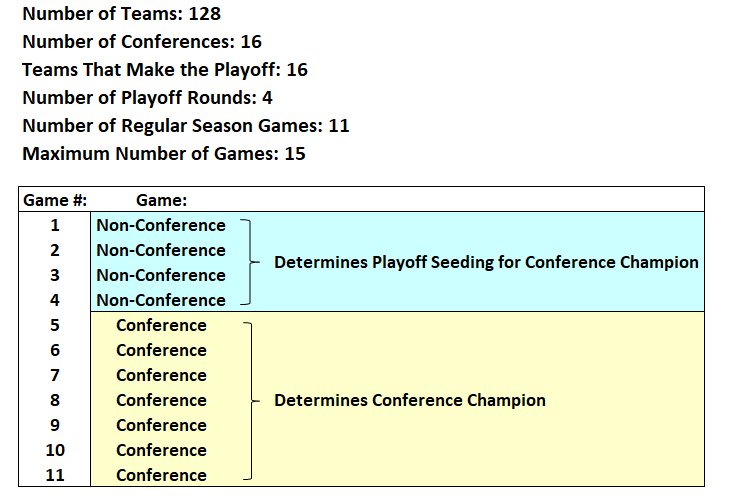In 2014 the NCAA finally caved to pressures that the championship system for the FBS (formerly known as Division I-A) was inherently unfair. Instead of using a computer algorithm to pick two teams out of over 120 to play in a championship, they decided to choose four teams by committee to compete in a 2-round playoff.
As I've said before, I think the days of the two round playoff are numbered.
In theory the two-round playoff was supposed to solve the issue of having multiple teams qualified for the national championship, since the size of the league prevents a robust means of determining who the true "best" team is (via a round-robin format).
In practice, the two-round playoff has just caused more controversy. Since the FBS is broken into 10 conferences, the "power five" conferences (the only ones with a real chance of making the playoff), and the "group of five" conferences (the ones who usually provide easy wins for the power five teams), the numbers aren't great for a two-round playoff.
Now that each power five conference (and most group of five conferences) have a championship game, they all have pretty clear contenders for the playoff. The trouble is, no matter how hard you try, you can't fit five conference champions into four playoff spots. Notre Dame also throws a wrench into the system this year, as they are undefeated but aren't in a conference (and since they don't play a conference championship game I think they should automatically be disqualified).
The next logical step in this process is to expand the playoff to three rounds by allowing eight teams to compete. I predict that this will happen in the next few years, and let the record show now that I don't think this is going to stop the complaining.
Why? Several reasons. First, an eight team playoff would be enough to fit all power five conference champions, which would be good. But the conferences are not created equal, and how would we determine who gets priority over whom? Would an undefeated group-of-five team like UCF get added to the playoff over a one-loss power five team that didn't win the championship? What about a two-loss power five team? Do the power five conference champions automatically get in, regardless of their record? Does a power five team in a "hard" conference that doesn't win the championship get in over a group-of-five conference champion, even if they have more losses? These are questions that would inevitably arise.
So then, after a few years of complaining, they would expand it to 16 teams, and then there would probably still be complaining. Where does it end? Should we just make it a 7-round 128 team playoff and let everyone in??
Here's The Solution, And You May or May Not Like It
How do we solve this problem? Well, the short answer is that it's unsolvable. There are simply too many teams in the FBS to have a robust season in a reasonable number of games that definitively determines who the best team is.
That being said, there is a way to it that would, at least in a technical sense, be more robust and more fair than the current system. Here's how it would work...
There are currently 129 teams in the FBS (and a couple more on the way). This is one too many, so whoever the last place team is currently, they're gonna have to go. 128 is the number we want, that's a power of two, and that's important.
Now, we take those 128 teams and split them into 16 conferences with 8 teams in each conference. In the regular season, each team plays every other team in their conference (for a total of 7 games) as well as 4 out of conference games. The four games that are out of conference will be the first four games of the season, and they will be chosen strategically so that each conference has games with every other conference.
The schedule works like this: the last seven games of the season will be a round-robin within each conference, i.e. each team will play the other 7 teams in their conference. The winner of the round robin will be the conference champion, and will then go into a 4-round, 16-team playoff (with the other conference champions represented).
The first four out of conference games of the season will be used to determine the seeding of the playoff. In these games, a team is playing to represent their conference. The conference with the best record will see their champion seeded first, which means they will play the last-place conference champion in the first round on the playoff.
The reason the out of conference games are played first is to reduce the chance that a team "throws" their out of conference games, which may happen if they know they aren't going to win their conference championship. Since these games are played first, the teams will probably try their best since it may end up benefiting them if they do go one to win their conference.
Some Minor Details:
This format depends on a 7-game round robin to determine a conference champion in each conference. There is a good chance that teams could tie for first place in the conference, so a tiebreaker must be determined.
If two teams tie, the process is fairly simple: the winner of the head-to-head matchup is the conference champion.
If three or more teams tie, then it gets more complicated. In most conferences currently, the CFP rankings determine the conference champion. In the format I have developed, there won't be a national ranking system (I mean I guess there still could be, but it wouldn't be official in any capacity). There are two reasonable ways that I think could be used to break a 3+ team tie. The first is to pick the team with the better out-of-conference record. This would give some extra weight to the out of conference games. The second is to pick the team with the best average scoring differential for conference games (or perhaps all games).
The problem with using the out-of-conference games as a tiebreaker is that each team will be playing a different out-of-conference schedule, which means that their schedules will vary in difficulty. A team that loses in this format may complain that they had a harder out-of-conference schedule. Using the scoring differential for the conference games would be a more fair way to determine the conference champion, but it has the downside of placing most of the importance of the schedule in conference games, which neglects the out-of-conference games.
Another problem with using scoring differential is that it creates an incentive for teams to "run up the score" against weaker teams. A simple remedy for this would be to cap the scoring differential for tiebreak purposes at something like 16 points, so there would be no incentive to win by a wider margin than 2 scores.
What If The Conferences Are Uneven?
Oh, you mean like they are now?
Definitely the biggest problem college football (or any sport with a large pool of teams) faces is how to group teams evenly. Right now the teams are definitely not grouped evenly, as half of the conferences in the FBS are basically considered "second tier". Even within the power five conferences, there are some pretty big disparities between, say, the SEC West and the ACC Coastal. These disparities *attempt* to be remedied by the almighty national ranking system, but it has been shown time and time again that it's much better to be a good team in a mediocre power-five conference than a great team in a hard power-five conference. Dominant wins against weaker opponents trump quality losses against good opponents.
So what happens if, in my format, there are too many good teams in a single conference? The good news is that if a single conference has a disproportionately large number of excellent teams, the fact that they are in a hard conference would not inhibit them from making the playoff. In fact, if the teams in a conference really are very good, then it helps the conference champion get a good seeding in the playoff. It does, however, create the problem that the best games may be played during the regular season instead of the playoff. This problem can be remedied by a periodic shuffling of teams into different conferences.
Would The New Format Actually Be Better?
From a technical standpoint, the new format would undoubtedly be more fair, in that it would give every team at the beginning of the season a legitimate chance of winning it all.
The question then becomes, would it make the sport better or worse? For all its flaws, college football is still a very exciting and enjoyable sport to watch. In my mind, part of the reason for this is due to its lack of a very robust playoff. While this has its problems, it undoubtedly makes the regular season exciting, because the regular season actually matters. Every game counts, and any loss can potentially put a team out of contention. While this may be inherently unfair for certain teams, it definitely keeps you on your toes throughout the season.
With the 4-round playoff there is more variability, as is the case with any playoff format. More rounds means more chances to lose, and this can potentially mean that at the end of it all, the winning team isn't actually the best, they are just the ones that looked out.
That said, what makes my format unique from several other sports with longer playoff formats is that the regular season still matters a great deal. Any losses during the in-conference round robin stage can potentially put a team out of contention, so it would still be exciting. The only games that might not be exciting are the out-of-conference games at the beginning of the season. But even these could be fun to watch if there are close races for high seeds, and you may find yourself rooting for other teams in your conference as if they were your own.
For now, this system probably represents too massive of a restructuring of the sport to ever catch on, so we'll have to deal with ever increasing playoff rounds that continue to please no one. But that's just how things work...




